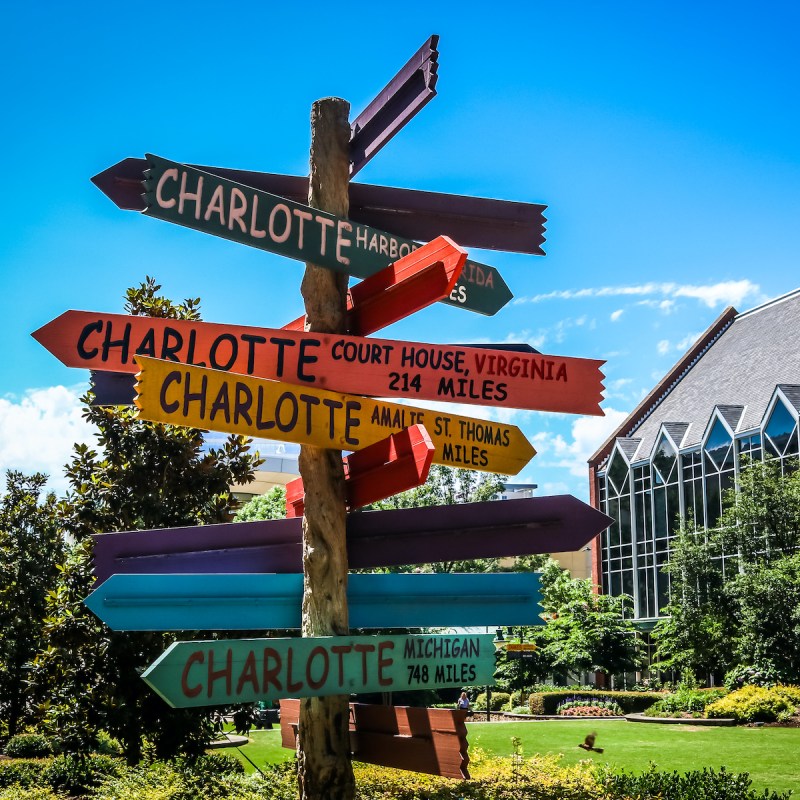
Charlotte is for foodies. Come with your appetite. Go big or stay home. If you want to stir the hornet’s nest, start a discussion about whether Charlotte is nipping at Charleston’s heels when it comes to cuisine.
Increasingly, African Americans are getting their slice of the city’s vibrant food scene, whether it’s restaurants, food trucks, pop-up dinners, or eateries like ice cream shops. Here’s a look at a few of them.

1. Leah & Louise
Leah & Louise has a Beale Street Memphis, New Orleans speakeasy feel. It’s just cool, sophisticated, and cozy with touches like vintage velvet couches. Owners Greg Collier, a two-time James Beard-nominated chef, and his wife and business partner Subrina, call the restaurant they opened in 2020 a modern juke joint. It’s a mesh of southern goodness, a little bit of Memphis (where Greg was born), Jackson, Mississippi, and New Orleans. The menu is straight out of heaven, with the ever-popular Leah’s Cabbage, slow roasted cabbage, pepper honey, smoked sausage, pork neck bisque, and the Innocent Bywater — pan seared North Carolina fish, brown butter, smoked pecans, butternut squash, and Veronique. Then there’s oxtail pupusa, burnt pepper sauce, collard green curtido, and Hernando Desoto — pork neck sliders, sorghum BBQ, slaw, and a house made bun. It was a flavor explosion I thoroughly enjoyed. What I like even more on the menu is the PWYC, the Pay What You Can community dish. Leah & Louise strives to give the best in food and service to every patron no matter what their status, social or financial.
That’s the kind of southern hospitality you’ll find in Charlotte. The Colliers came to the city a decade ago from Arizona. They were ready to return to the south. “We Googled cities good for Black small businesses and Charlotte came up,” says Subrina, a 2020 James Beard Foundation Women’s Entrepreneurial Leadership Fellow.
They’ve made their mark on the Queen City. The Colliers were among the founders of The Soul Food Sessions, dining events started in 2016 to acknowledge and support people of color in the culinary arts, restaurant, and hospitality industries; and beverage services. In 2018, they were named Charlotteans of the Year by Charlotte Magazine. In 2019, they hit the Charlotte restaurant scene with Uptown Yolk, a breakfast and brunch spot that closed in 2021 but will get a second life at a new location and tweaks to the concept in the spring of 2022. Leah & Louise was one of Esquire Magazine’s best new restaurants of 2020.
The Colliers went next level with their inaugural BayHaven Food & Wine Festival, a 3-day event last October that brought in 60 Black chefs — many of what Subrina calls, “Greg’s OG chefs,” mixologists, and Black-owned wine and spirit brands from around the U.S. — to Charlotte’s innovative Camp North End, a 76-acre mixed-use development with restaurants, retail shopping, and outdoor space for music and lounging. Inspired by the success of the Soul Food Sessions, they came up with the idea to do a Black wine and food festival. “There’s so much Black talent and too few of us at food festivals. Instead of continuing to ask for diversity, we decided to do our own thing,” says Subrina.
The event with its Harlem Renaissance theme, dinners, tastings, food truck carnival, jazz brunch, and more, was successful. There are plans for another one. Who knows what else comes next for the Colliers?

2. What The Fries
All French fries are not created equal. You won’t be the same after sampling the Smokey Bacon Fries with Boursin cheese sauce, diced tomato, scallions, and ranch drizzle. The same goes for the lobster mac & cheese fries with Conchiglie pasta, Boursin cheese sauce, Gouda and Asiago cheeses, parsley, and red cabbage. You get the picture. Yum. These extra special fries are the creation of chef/owners Jamie Barnes and Gregory Williams, Johnson & Wales University classmates and former roommates. They started What The Fries as a catering company in 2014 and a year later retrofitted a FedEx delivery truck into a food truck. Last March, they opened their first brick-and-mortar restaurant in Charlotte and put the food truck on hiatus.
“Things have been good for us. Our growth within this first year has been the most surprising as it exceeded our expectations. Our grassroots customers from our food truck helped us grow with exposure to new customers by word of mouth. Social media has also played a vital role in our customer reach,” says Barnes.
Being in Charlotte is a plus. “The Black community in Charlotte is extremely supportive of Black-owned businesses. That is a big reason Charlotte is an excellent location for Black-owned restaurants. The group Eat Black Charlotte (EBC) has been good at recognizing and creating exposure for these restaurants. EBC dined with us along with Charlotte’s Mayor Vi Lyles this year which was a great honor. Charlotte’s community has embraced the support of Black-owned businesses,” says Barnes.
What The Fries is off to a roaring start, with kudos like Charlotte Magazine’s Best New Restaurants in Charlotte 2021 and elsewhere. They will be featured in late January on The Cooking Channel’s Food Paradise.
No doubt, the Black-owned restaurant scene has grown in Charlotte. Williams says, “There are more resources to fuel the growth locally through grants for minority-owned businesses, support from other Black-owned businesses, community support, and more.”

3. Ebony Wine & Spirits
Camillya Masunda launched her Ebony wines in 2020. She is the owner of Charlotte’s first Black-owned wine and spirits company.
The last year took on a life of its own. She went to six cities for her Ebony Wine Experience Tour and participated in events like the BayHaven Wine & Food Festival to get her name out there. She met the owner of Mermosa Wines, Desiree Noisette, at the festival. They hit it off and met up after the festival, and Noisette gave her pointers on the wine business.
“The BayHaven Festival provided us with so much opportunity to meet and network with some amazing people. It put the brand in the space with our consumers and supporters and in the same space with restaurants and other, much larger wine and spirit producers. It opened the door to possible collaborations but most importantly, it curated a community of encouragement and enjoyment,” says Masunda.
She is a Charlotte cheerleader. “Charlotte is one of those cities that will invest in you if you invest in it,” says Masunda. “When you find your tribe here, you are sure to be supported.”
4. Mert’s Heart And Soul
Back in 1998, James Bazzelle started Mert’s Heart And Soul with the mission to serve good southern food. Mission accomplished. The restaurant is big on low country cuisine. Expect a generous portion of comfort food like the macaroni and cheese that tastes like grandma’s, shrimp and grits, fried chicken, Charleston red rice, collards, and cornbread that you can’t stop eating. Mert’s is beloved by locals as well as folks like former president Barack Obama, Mariah Carey, and Kevin Hart. It was showcased on the Food Network’s Diners, Drive-Ins and Dives.
Bazzelle, who co-owns the restaurant with his wife Renee, is thrilled. “Charlotte has young entrepreneurs with new ideas and culinary vision. There’s also more of a willingness to help black entrepreneurs because of the summer of 2020,” says James.
Charlotte offers much. He says, “It’s like a lot of small towns or neighborhoods, but it has a big city vibe and keeps growing.”

5. Serving The Culture
You can’t go wrong with great food and great music. Since 2019, Chef Shelton Starks, co-founder of Serving the Culture, has been serving up the dynamic duo with pop up dinners around Charlotte. “I was inspired by my love of the culinary world and music, particularly Hip-Hop,” says Starks.
The dinner series highlights African American chefs, culinarians, and mixologists. “Our mission is to expose our attendees to high-end cuisines and cocktails curated by the super talented chefs and mixologists who are typically not celebrated in their industries,” says Starks.
The dinners have a music theme that is reflected in the food and playlists. Some past dinners have featured artists like Missy Elliott vs. Mary J. Blige, Bad Boy vs. Death Row records, and the Wu-Tang Clan.
The Wu-Tang dinner experience featured nine courses and four cocktails that were inspired by the group and their songs. In between dishes, guests rapped along to Wu-Tang tunes and answered trivia questions for Wu-Tang-themed prizes.
It’s big fun. Starks hopes to replicate the dinners in other cities. Charlotte though, with its diversity of entertainment and things to do, is a hot spot. But, like elsewhere, access to capital for further spurring restaurant growth could be better. He adds, “Charlotte’s a great place for African American-owned restaurants and eateries. There are a lot of young, creative, talented Black chefs graduating from Johnson & Wales University and there is a growing demand for Black foodways.”

6. Chef Joya, Owner Of Cooking With Joya
Adjoa Courtney, also known as Chef Joya, is known for her pop-up dinners around Charlotte and cookbooks like From My Ancestors Table: Africa & Caribbean Vegan Food For the Soul. While she will continue her pop-ups this year, she will focus on getting in the lab to create more products, cookbooks, teaching, and resource guides.
She says, one of the cool things about Charlotte is all the opportunities. “BayHaven was an awesome experience. I loved being surrounded by so many other talented Black Chefs. I made a lot of friends that weekend. More importantly, I was able to provide a high-quality vegan experience to people who had never tried vegan food before. I changed a lot of minds that weekend about what some people thought they knew about plant-based cuisine. I was able to show that it’s all about flavor, creativity, and taste!”

7. Detour Coffeebar
After 10 years in the corporate rat race, when Mike Hargett was asked by an HR rep to describe his “ideal role,” he remembered the days of being the bookstore barista and how serving the public was more rewarding than titles or promotions. So he developed a version of the old bookstore barista into a mobile format, Detour Coffeebar.
Introducing the idea of a “coffee truck” to potential event hosts and property managers was difficult. “They didn’t understand that we’re bringing the coffeehouse experience to their parking lots,” says Hargett.
Fast forward to today and the challenge is standing out among the many coffee trucks. Nothing was as tough as surviving 2020 as a new and Black-owned business, he says.
Hargett’s looking forward, excited by the Black-owned food scene in Charlotte. “It’s growing and becoming more diverse even within itself — Black-owned ice cream shops, vegan restaurants, gardening centers, wineries, and so much more — it’s truly inspiring,” he says.
For more on Charlotte and delectable food culture, check out these stories:
